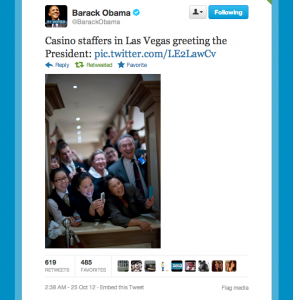With much of the media and the full force of the Obama campaign having battered Mitt Romney with the truth over his misguided stance on the auto industry rescue, the Romney campaign is out with an ad today that assembles a jumble of lies and misleading claims into a 30-second spot. T ravis Waldron of ThinkProgress has done an excellent job synthesizing the falsehood and bogus claims, first taking quotes from the ad, then breaking them down:
ravis Waldron of ThinkProgress has done an excellent job synthesizing the falsehood and bogus claims, first taking quotes from the ad, then breaking them down:
1. “Mitt Romney has a plan to help the auto industry.” No specific plan is referenced in the ad, and Romney’s campaign web site does not include a plan to “help the auto industry.” In 2008, Romney wrote a New York Times editorial titled, “Let Detroit Go Bankrupt,” and he re-upped his call against the auto rescue during the Republican primaries this year.
2. “[Romney] is supported by Lee Iaccoca and the Detroit News.” Chrysler Chairman Lee Iaccoca has indeed endorsed Romney. The Detroit News, a self-described “conservative newspaper,” endorsed him last week. But in that endorsement, the paper slammed Romney’s “wrong-headedness on the auto bailout.”
3. “Obama took GM and Chrysler into bankruptcy.” Obama did take both companies into a managed bankruptcy, the path Romney says was originally his idea. Romney, however, supported private sector financing of the bankruptcy, a plan that was “pure fantasy” at the time since no private lenders could lend to the companies in the middle of the financial crisis. Without federal intervention, the companies would have almost assuredly collapsed, costing 1.3 million jobs, according to industry estimates.
4. “[Obama] sold Chrysler to Italians who are going to build Jeeps in China.”This week, Romney claimed he read a news story that said Chrysler was planning to “moving all production to China.” The Bloomberg News piece he referenced, though, made it clear that Fiat, the Italian company that now owns Chrysler, was opening new factories in China to make Jeeps for Chinese consumers. No American plants will be closed, and no American jobs will be lost. The ad’s claim may not be as false as Romney’s previous statement, but it is certainly misleading.
Averaging all the available state polls, it is clear that in Ohio Romney is trailing President Obama by around 2-3 points. Desperate to make up that ground, he’s resorted to wild claims, such as the one about Jeep moving US operations to China, which Chrysler immediately denied. What’s more, newspapers like the Toledo Blade, which endorsed President Obama today, wrote this in their editorial this morning: The strategy of the Romney campaign is pretty clear: drape a fog of murky ambiguity over this issue, since it is such a clear winner for the president. Lie, obfuscate, muddle
“That [auto] rescue was vital to Ohio, which depends on the auto industry for 850,000 jobs—one of every eight. It has preserved and created assembly and parts production jobs in Toledo and across the state. Without it, Chrysler and GM likely would have gone out of business and the domestic industry and supply chain would have collapsed, taking Ford with them. Instead, U.S. automakers now are preparing to achieve huge gains in the fuel efficiency of their cars and trucks. The auto bailouts began under a Republican president, George W. Bush, but Mr. Romney has continued to oppose them. In last week’s debate, he claimed disingenuously that he would have supported federal “guarantees” of private investment in the automakers. But in the depths of the Great Recession, no such investment was forthcoming. A high-powered businessman—and the son of a Detroit auto CEO who plays up his Michigan roots—might be expected to acknowledge that.”
The strategy of the Romney campaign is pretty clear: drape a fog of murky ambiguity over this issue, since it is such a clear winner for the president. Lie, obfuscate, muddle, smile, and sow confusion, especially at this late moment, barely a week before Election Day. We can’t let it work. Thank you for reading this post and sharing as widely as possible.

 ravis Waldron of ThinkProgress
ravis Waldron of ThinkProgress







